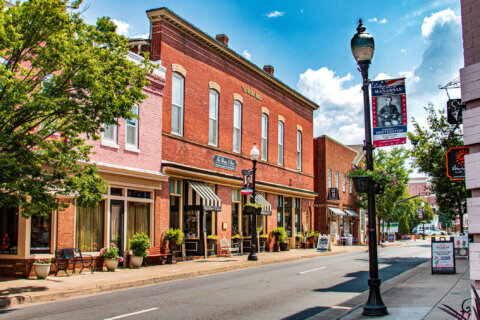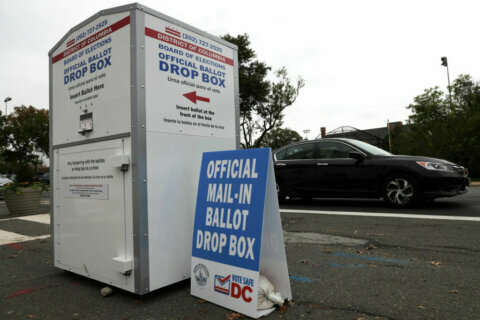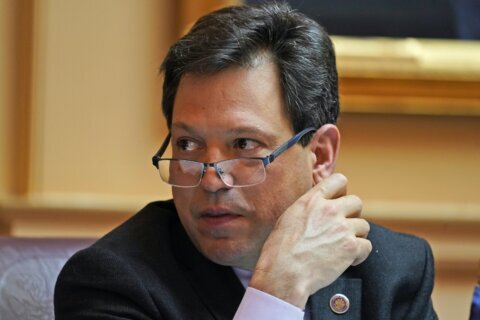EDITOR’S NOTE: Polls closed in Virginia at 7 p.m. You can find results for the commonwealth’s U.S. House and Senate races, as well as local elections, bond questions and constitutional amendments.
Voters in Virginia will cast ballots for president, the U.S. Senate and House, and local races in an election like no other.
Here’s what you need to know.
When are the polls open Nov. 3?
Polling places are open from 6 a.m. to 7 p.m. on Election Day.
If you’re in line by 7 p.m., you’ll get to vote.
Identification
Voters in Virginia are required to show an ID when they go to the polls. These forms of identification are considered valid:
- Virginia driver’s license
- Virginia DMV-issued photo ID
- U.S. passport
- Employer-issued photo ID
- Student photo ID issued by a school, college or university located in Virginia
- Other U.S. or Virginia government-issued photo ID
- Tribal enrollment or other tribal photo ID
- Virginia Voter Photo ID card
- A copy of a current utility bill, bank statement, government check, paycheck, or other government document containing the name and address of the voter.
See all forms of acceptable ID.
- Sign up for WTOP’s elections newsletter
- DC voter guide
- Maryland voter guide
- Virginia voter guide
- Presidential Election News
- Congressional Election News
- Local Politics and Elections News
On the ballot
All Virginians will vote for U.S. president and one of the state’s two U.S. Senate seats, as well as one of the 11 U.S. House races.
President
Incumbent Republican Donald Trump is running against the Democratic former Vice President Joe Biden and Libertarian Jo Jorgensen.
U.S. Senate
Incumbent Democrat Mark Warner is running against Republican challenger Daniel Gade.
U.S. House
All 11 seats in the U.S. House from Virginia are up for election.
WTOP’s Nick Iannelli said the races to watch are in the 7th Congressional District, where Republican Nick Freitas will run against the incumbent Democrat Abigail Spanberger, coming to the end of her first term after defeating Republican incumbent Dave Brat, and the 2nd, where former Rep. Scott Taylor will face incumbent Democrat Elaine Luria, who took his seat away in 2018.
Larry Sabato, director of the University of Virginia Center for Politics, told Iannelli that the incumbents in these races will be favored, but they will be “hard-pressed.”
Another interesting race could happen in the 5th Congressional District, where Democrat Cameron Webb will take on Republican Bob Good, who ousted incumbent Denver Riggleman in the primary, in part because he was criticized within his own party for officiating a same-sex wedding last year.
“They ousted the incumbent, and that gives Democrats a chance there,” Sabato told Iannelli. “They’re not the favorites, but it gives them a chance.”
Constitutional amendments
Virginians will vote on two amendments to the state constitution: The first would establish a commission comprising eight members of the General Assembly and eight members of the public that would draw new lines for congressional and assembly districts. The full assembly would then vote on these lines, but couldn’t change them, and the state Supreme Court would draw the lines if the commission or the assembly couldn’t agree.
The second exempts the vehicles of disabled veterans from taxation.
Arlington
U.S. House
In Arlington County, 8th District Democratic Rep. Don Beyer is running against Republican Jeff Jordan.
County Board
Incumbent Chairwoman Libby Garvey, a Democrat, is running against independent Audrey Clement.
School Board
David Priddy, Cristina Diaz-Torres and Symone Walker are running for two seats.
There are also bond referendums for schools, parks, the stormwater program and more.
Ballot drop-off locations: You can find them on the county Board of Elections site.
Alexandria
There are no local races on the Alexandria sample ballot. Residents will vote on the presidential race, the U.S. Senate race and the Beyer-Jordan contest (see the Arlington section), as well as the constitutional amendments.
Ballot drop-off locations: Same as in-person early voting locations. You can find them on the Alexandria government website.
Fairfax County
Voters in Fairfax County will cast ballots for president and U.S. Senate, like all Virginians.
Depending on where you live, you’ll be casting U.S. House votes in the Beyer-Jordan race, the 10th District contest between Democratic incumbent Jennifer Wexton and Republican Aliscia Andrews, or the 11th District race between Democratic incumbent Gerry Connolly and Republican Manga Anantatmula.
County voters will also cast ballots for or against four proposed bond issues, for libraries, parks, transportation, and health and human services.
In the town of Herndon, voters will pick between Sheila Olem and Roland Taylor for mayor, and choose six members of the town council from among Stevan Porter, Pradip Dhakal, Sean Regan, Naila Alam, Cesar del Aguila, Signe V. Friedrichs, Jasbinder Singh and Clark Hedrick.
Ballot drop-off locations: You can drop off ballots at any of the 14 satellite voting locations in the county, the Fairfax County Government Center or at any precinct on Nov. 3.
Loudoun County
Voters will cast ballots for president and U.S. Senate, as well as the Wexton-Andrews U.S. House race and the constitutional questions (see above).
They’ll also vote on bonds for school, park and road construction, as well as the expansion of the fire academy and renovating a fire station.
In Leesburg, they’ll vote for either Kelly Burk or Ron Campbell for mayor, and pick three among Zach Cummings, Ara Bagdasarian, Bill Replogle and Kari Nacy for the town council.
Ballot drop-off locations: They’re on the Loudoun County Board of Elections site.
Prince William County
Voters will cast ballots for president, U.S. Senate and the constitutional questions.
Depending on their U.S. House district, they’ll also make their picks in the Wexton-Andrews race, the Connolly-Anantatmula race or the District 1 rematch between Republican incumbent Robert Wittman and Democratic challenger Qasim Rashid.
Ballot drop-off locations: They’re on the county Board of Elections site.
Voting by mail
With the COVID-19 pandemic making it dangerous to stand in traditional polling-place lines and spend time in small indoor spaces, the Virginia General Assembly voted to do away with the requirement that voters have a specific reason for asking for an absentee or mail-in ballot (in Virginia, the two are the same thing).
Virginians have taken advantage: On Sept. 15, Gov. Ralph Northam said almost 800,000 absentee ballots had been requested, more than the total number of absentee votes recorded in the 2016 election.
If you mail in your ballot, it needs to be postmarked by Election Day, Nov. 3, and it will be accepted if it gets to your local board of elections by noon on Nov. 6, with counting expected to continue for days after that.
Virginia Department of Elections spokeswoman Andrea Gaines said in an email that election night results have always been unofficial, and that the final, official tabulation takes days.
WTOP’s Mitchell Miller and Nick Iannelli have put together a definitive guide to mail-in voting.
Important dates
In-person early voting began on Sept. 18. The last day to register to vote was Oct. 13 and the last day to ask to have a ballot mailed to you was Oct. 23. If you waited until Oct. 23 to ask for a ballot or you haven’t mailed in your ballot yet, the Virginia Board of Elections says you should return it in person — you shouldn’t trust that a mailed ballot will get there in time.
If you mail in your ballot, it needs to be postmarked by Election Day, Nov. 3, and it will be accepted if it gets to your local board of elections by noon on Nov. 6, with counting expected to continue for days after that.
Early voting
Early voting was from Sept. 18 to Oct. 31. Voters did not need a special reason to vote early, like they did in previous elections.
If you requested a mail-in ballot but wanted to vote in person, you could do so if you brought the unopened mail-in ballot with you.
Links below will take you to early voting sites:
- Alexandria
- Arlington County
- Culpeper
- Falls Church
- Fairfax County
- Fauquier
- Fredericksburg
- Loudoun County
- Prince William County
- Spotsylvania
- Stafford County
WTOP’s Nick Iannelli contributed to this report.








